#servile wars
Text

The Death of Spartacus by Hermann Vogel
#spartacus#art#hermann vogel#ancient rome#slave revolt#slave rebellion#history#antiquity#thracian#gladiator#gladiators#roman republic#roman#romans#rebellion#revolt#uprising#europe#european#servile wars#third servile war#italy
159 notes
·
View notes
Photo
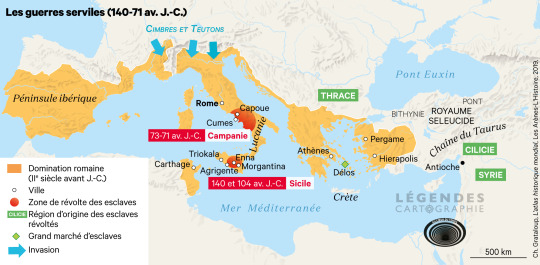
Servile wars in the Roman world,1st century BC.
by LegendesCarto
61 notes
·
View notes
Text
Watching the “bread and circuses” epsiode of Star Trek counts as studying for teaching my Roman history/culture class right
7 notes
·
View notes
Text
𝔖𝔢𝔳𝔢𝔯𝔢𝔡 𝔖𝔞𝔳𝔦𝔬𝔯 - 𝔖𝔭𝔬𝔦𝔩𝔰 𝔒𝔣 𝔚𝔞𝔯
#Severed Savior#Servile Insurrection#Spoils Of War#Release date:#November 25th#2008#Full-length#Genre:#Technical Brutal Death Metal#Themes:#Death#Violence#Anti-Christianity#Misanthropy#USA
4 notes
·
View notes
Text
Rewatching season 1 of xena for the first time in probably 15 years and who tf was gonna tell me that Sam Raimi snuck clips from Kubrick's (fuckin terrible) Spartacus movie into episode 13?
Like, I know Raimi loves the history (who doesn't love the third servile war of Rome? They came closest of anyone to bringing the empire to its fucking knees) he made a whole Spartacus tv show on Starz.
But im gonna need a little warning before somebody starts playing a bad movie in the middle of a good show.
#im the biggest Kubrick anti and im not sorry#xena warrior princess#spartacus#bard school#athens city academy of the performing bards#3rd servile war of rome#i took a kubrick class in college and have seen every single one of his films#my hatred is informed and well-earned
3 notes
·
View notes
Text
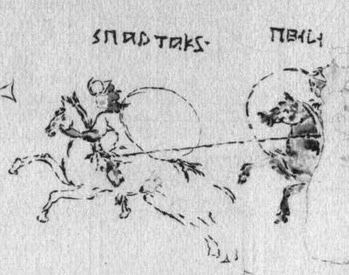
Spartacus (MIA 71 BC) in a near contemporary depiction from a Pompeiian (pre 79 AD) tavern graffito. I don’t know of any other roman depictions of Spartacus.
4 notes
·
View notes
Link
The footstool of NATO
#Canada#NaziGate#Ukraine#NATO#Poland#war crimes#Yaroslav Hunka#extradition#servility#obsequiousness#timidity#scandal
0 notes
Text
youtube
#music#aram khachaturian#adagio#spartacus and phrygia#marcus crassus#third servile war#saturday working music#rome#roman#spqr#tv series#onedin line
1 note
·
View note
Text
im sure its been said already but as the election draws near more and more liberals will come out of the woodwork to shame people with a conscience to give away their vote to the democrats for free. i'm already seeing posts saying "why aren't people more concerned about a trump presidency?" you want to know why? it's because people already know he's bad. everyone already knows what he is and what he's done and what he'll do. there's nothing to discuss. he's a racist despotic worm of a man. there's nothing else to say.
biden is currently president. the genocide is happening under his watch. he's the one funding isra*l and arming them; he's sidestepped congress more than once to give them weapons. by oct. 27, the biden administration already knew that "Israel was regularly bombing buildings without solid intelligence that they were legitimate military targets." the state department/biden have engaged in atrocity propaganda, cast doubt on the legitimacy of the death toll recorded by the gaza health ministry, and so on. the united states is currently in the process of trying to pin the "war in gaza" on netanyahu (see sen. schumer's speech) after months of backing blatant genocide as a means to act as if they're "doing something" about the genocide (Instead of, say, threatening to cut off all aid to israel with the condition that all hostilities in gaza, the west bank, and occupied jerusalem are halted immediately and permanently, allowing palestinians freedom to travel, allowing aid into gaza, etc etc etc.)
the long and short of it is that liberals view their own lives as being worth more than palestinians'. that's it. they'll vote for another 4 years of the guy ushering in genocide and supporting apartheid + settler colonialism because he isn't outright attacking them (despite various laws and rulings happening both at the supreme court level and at the local level all over the country that will endanger people). they'll settle for the illusion of safety and security and shame anyone with a conscience and accuse them of "supporting the republicans" when in an actual democracy you would be able to use your vote as leverage to extract concessions from those who want to be elected. that's how it's supposed to fucking work.
democrats are not owed people's vote. if biden loses, it will be biden's fault; it will be his campaign's fault; it will be the democrats' fault. trump is bad; the republicans are bad. we already know this. this is not an endorsement of either. but if democrats are too cowardly and feckless and servile to the motivations of the american empire and never do anything for their constituents then why the fuck should anyone vote for them. you want to get mad at someone, why don't you do something useful and stop worrying about team-sports with a purely selfish basis and start hounding the people in power who are supposed to serve you, the voter.
#i think i already said this and frankly idc#uspol#📁.zip#to me personally it's abhorrent and vile to tell palestinians 'biden is facilitating the murder of your people culture and history but you#still have to vote for him!!1' like how is that not unbelievably callous and ghoulish#frankly speaking. a lot of this 'you should be concerned about trump' is going to turn into#blaming palestinians and arabs and muslims and anyone remotely with a conscience for biden's loss#instead of doing something productive like pushing for people in power to do something they'll nitpick and belittle#and tell palestinians + arabs and muslims + everyone who understands that genocide is bad that they SHOULD#settle for a decrepit genocidal monstrous freak who is CURRENTLY facilitating genocide because#it makes THEM feel better and they aren't personally threatened (yet) by the guy currently in power#any and all 'you're not taking trump seriously' comments should be met with extreme skepticism#because i promise i PROMISE that the vast majority of people unhappy with biden are not going to turn around and vote for trump#and if they do? well guess what THAT'S BIDEN'S FAULT! nevermind the vote uncommitted campaign that was very successful and#will be replicated in the near future. but liberals only care about asthetics and superficial and not#about real material change which is why they'll dress up their callousness and racism in a 'you hate gay people if you dont vote for biden'#like this country is already going to shit we are rapidly descending into fascism and i dont see biden doing anything to even remotely#challenge it do you???? once agian. NOT an endorsement of the republican party but my GOD when the 'lesser evil'#is DOING the evil or normalizing the evil then you cannot settle for 'the lesser'! end of story.
385 notes
·
View notes
Photo
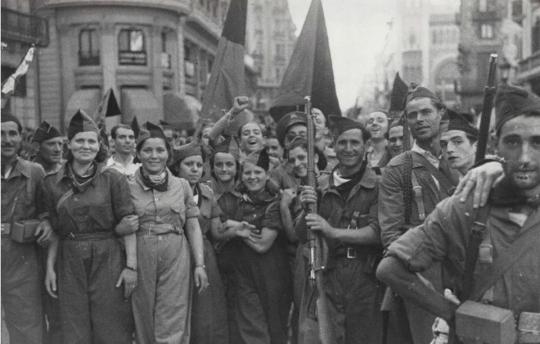
On this day, 19 July 1936, in response to a right-wing coup by general Francisco Franco, workers across Spain took up arms and launched one of the most far-reaching social revolutions in history. The ensuing civil war pitted the working class against the Spanish capitalists, who were backed by Nazi Germany and fascist Italy. In the revolutionary areas, anarchist and socialist workers and peasants took over workplaces and land and began to run them collectively. Thousands of mostly working class people came from all over the world to aid the workers of Spain. One of them was British socialist author George Orwell, who described the scene in Barcelona: "It was the first time that I had ever been in a town where the working class was in the saddle. Practically every building of any size had been seized by the workers and was draped with red flags or with the red and black flag of the Anarchists; every wall was scrawled with the hammer and sickle and with the initials of the revolutionary parties… Every shop and café had an inscription saying that it had been collectivised… Waiters and shop-walkers looked you in the face and treated you as an equal. Servile and even ceremonial forms of speech had temporarily disappeared. Nobody said ‘Señor’ or ‘Don’ or even ‘Usted’". Western democracies, including Britain and France, abandoned the republic and enforced a blockade on Spain which stopped the flow of aid and weapons to the anti-fascists. Meanwhile, Italy and Germany openly flouted the ban, and the US oil giant Texaco supplied the nationalists with oil and other supplies without even demanding payment while stopping any supplies to the republic. Ultimately, after nearly three years of bitter and bloody warfare, the nationalists with their superior weaponry and equipment, were victorious. Learn more in our podcast eps 39-40. We've also got books and more commemorating it, here: https://shop.workingclasshistory.com/collections/spanish-civil-war?sort_by=created-descending https://www.facebook.com/photo.php?fbid=664426942397191&set=a.602588028581083&type=3
380 notes
·
View notes
Text
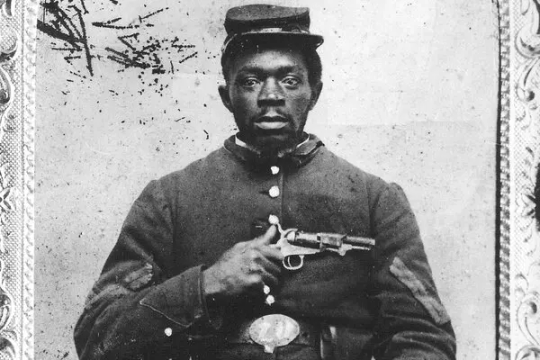
What happened to colored troops taken POW by Confederates in the Civil War?
Three-fifths of all African troops in the Union army were former slaves and those that fought in combat units did so at great risk to their lives (beyond the expected risks associated with combat). The Confederate government’s official position was that black POWs would be executed, reclaimed by their former masters or sold into slavery. Lincoln’s threats of reprisals helped minimize the impact of Confederate actions.
Details of the brutality African soldiers suffered are known, but with less specificity. We know of the multiple slaughters of surrendering or captured blacks that occurred. And, we know that armed Africans were the South’s worst nightmare as southerners were terrified that the example of these soldiers would “infect” the rest of the slave population and inspire them to take-up arms against their enslavers. In southern eyes, that alone warranted the harshest treatment for captured Africans.
What is clear is that these soldiers faced harsher and more cruel treatment at the hands of their captors than did their white counterparts. We know with clarity the physical violence that slaves suffered pre-war as well as after the war. Further, while 14% of Union prisoners died while being held as POWs and 11.8% of Confederate POWs died in northern captivity, historian Caroline Newhall notes that almost 35% of African POWs died in southern captivity. These data points converge with official Confederate statements and southern attitudes on slaves as property and provide strong evidence of the cruelty African Union soldiers faced.
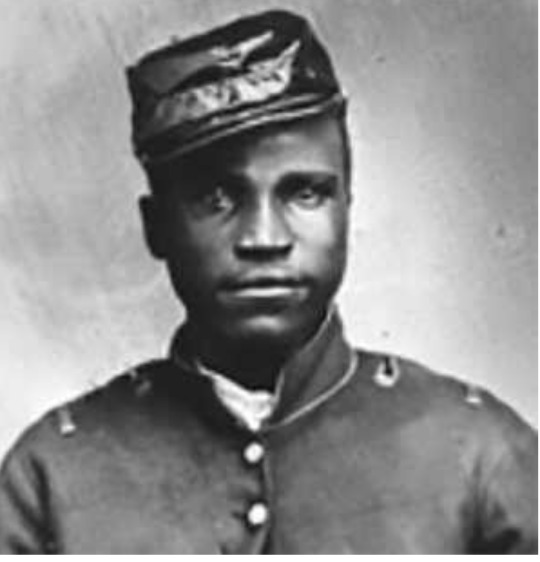
Cruelty and atrocities against African Union soldiers were not random acts of war, but were legislated and directed by the Confederate Congress and Jefferson Davis himself.
In late 1862, Davis stated: “All negro slaves captured in arms be at once delivered over to the executive authorities of the respective States to which they belong.” A resolution later adopted by the Confederate Congress provided that all “negroes or mulattoes,” slave or free, taken in arms should be tried for inciting servile insurrection and be subject to the death penalty.
In a letter to General Beauregard on this issue, The Confederate Secretary of War pointed out that "Slaves in flagrant rebellion are subject to death by the laws of every slave-holding State" but that "to guard, however, against possible abuse...the order of execution should be reposed in the general commanding the special locality of the capture."
Lincoln responded to this by threatening to retaliate against Confederate prisoners whenever African soldiers were killed or enslaved.
Davis publicly denounced Lincoln’s order; but, it did have — for the most part — the desired effect, as most African prisoners were not treated with the harsh justice mandated by Confederate policy, even though the Confederacy never officially acknowledged African-Americans as P.O.W.’s. Instead, what emerged were inconsistent practices in dealing with captured African American troops, depending on the time, place and the commander into whose hands they fell. Indeed, some Confederate officers encouraged the killing of African-American soldiers rather than taking them prisoner, and the atrocities committed against surrendering African soldiers at Poison Spring, Fort Pillow and Petersburg are now well known.
If not executed, captured African soldiers often found themselves treated very differently from white prisoners. Instead of being confined to camps, many African-American prisoners were put to forced labor.
As Robert Jones, a African soldier captured at Milliken’s Bend, La., recalled, “They took me to … Rust, Tex., where they … had me at work doing every kind of work, loading steamboats, rebuilding breastworks, while I was in captivity.”
Near Fort Gilmer, Va., captured African troops were forced to work under enemy fire in the trenches. In retaliation, the Union general Benjamin F. Butler placed an equal number of Confederate P.O.W.’s on forward trenches. Within a week, the African prisoners were removed from the front lines.
The sentiment that Africans under arms aroused -- along with the ingrained hostility of many Confederate soldiers -- set the stage for wartime atrocities. The most notorious incident occurred at a small Federal outpost north of Memphis, Tennessee, where Confederate cavalrymen under Nathan Bedford Forrest attacked Fort Pillow, which was garrisoned by about 500 troops.
More than half of the soldiers were African. The superior Confederate force overwhelmed the fort's defenders; Union casualties were high. But after the Federals surrendered, Forrest's men shot and killed a number of unarmed soldiers and officers, both black and white.
In October 1864 Saltville, Virginia, Confederate soldiers executed unarmed African prisoners, even raiding a hospital on two separate occasions and murdering wounded Africans in their sickbeds.
High casualty rates in combat were also common for African American units — usually for two reasons. First, since Africans had not previously served in the military, they were inexperienced fighters. Second, feeling social pressure to prove themselves as men, they often took risks on the battlefield that their white counterparts would not.
But, despite facing intense racism and humiliating treatment from their own white colleagues in arms, Africans excelled in combat, providing an additional, critical edge in manpower to what the Union already possessed.
One Union captain explained the significance of African military participation on the attitudes of many white soldiers. "A great many [white people]," he wrote, "have the idea that the entire Negro race are vastly their inferiors. A few weeks of calm unprejudiced life here would disabuse them, I think. I have a more elevated opinion of their abilities than I ever had before. I know that many of them are vastly the superiors of those...who would condemn them to a life of brutal degradation."
Of the 180,000 African Americans who fought for the Union, 37,300 died. More than 20 African Americans were awarded the Congressional Medal of Honor, the nation's most prestigious military decoration. Fourteen of those men earned their medals at Chaffin's Farm.
#african american#african#afrakan#kemetic dreams#brownskin#afrakans#brown skin#africans#african history#african american history#medal of honor#chaffin farm#military#military history
380 notes
·
View notes
Note
do you have any non-fiction book recs on slavery and the Third Servile War in ancient rome? I've seen posts that defended or played down slavery in ancient Rome claiming they treated their slaves well and typically didn't abuse them without a good reason, because they'd risk the loss of property and these posts just didn't seem right to me. If they actually treated them well there wouldn't have been slave uprisings. If they slaves had rights they wouldn't have been called slaves.
i haven't read a lot of modern accounts of the third servile war, but shaw's spartacus and the slave wars is a phenomenal sourcebook for you to look through ancient documents about the servile wars and the general treatment of slaves. it contains ancient historical texts, but it also pulls from relevant sources like letters and inscriptions that discuss things like laws pertaining to fugitive slaves. some of my followers and other classicists in the tumblr classics community who know more about the subject than i do might be able to offer up some other sources.
as far as treating their slaves well- the first thing to remember is that slavery, no matter how "well" the slaves were treated, is still slavery. at its core, slavery treats human beings as if they were property and strips them of their rights. in addition, while some particularly skilled slaves or slaves that had been in a household for a long time were treated more compassionately than others, the vast majority of slaves were not given this treatment. many of them were treated with little to no dignity and were forced to complete difficult, sometimes dangerous, jobs. for every tiro we know of, there were probably thousands of unnamed slaves being treated as little more than expendable farm equipment. the relative good fortune of a handful of slaves does not in any way justify slavery.
117 notes
·
View notes
Text
People honestly want to believe that Claude isn’t either OOC or badly written in Hopes, but you really expect me to believe that the guy who was three steps ahead of Edelgard and Dimitri on their respective routes in Houses in order to secure the survival of himself and his friends is also the same fucker who banks on the war ending in Hopes by killing Rhea when the credits roll and it shows it didn’t fucking work?
It’s no surprise that these same people like to claim dislikers of Hopes Claude only like him for being a “heehee funny no problem brown man” and trying to infer we’re racist when in actuality taking the hypercompetent and intelligent brown guy and making him impulsive, violent, easy to mistrust by his own allies, willing to drag innocents into a conflict to save his own skin, and being extremely serville to a white woman’s violent and vengeful ignorance is actually a more extremely fucking racist way to write him than anything that was done in Houses proper.
Like actually go fuck yourselves for saying this shit lol
#fire emblem three houses#fe3h#fire emblem#fire emblem discourse#claude fire emblem#claude von riegan#from week 1 i never trusted the 'claude should've been more underhanded and villainous' folks like wtf is wrong with you#y'all forced an extremely negative and villainous interpretation onto the word schemer and ran with the expectation#that he'd do fucked up shit and now look where we are#a warriors spinoff where nothing gets tied neatly with a bow cuz y'all love drama without substance or cohesion#rant
154 notes
·
View notes
Text
Just finished Harriet Flower's Roman Republics. I'll write up my notes on the final chapters later, but here's my general thoughts for now:
I like the basic idea of dividing the republic into more than just the early/middle/late periods, but I don't think all of Flower's proposed divisions are well supported.
She brings up some good points that are often overlooked (like the impact of the Servile Wars on Tiberius Gracchus' tribunate and the Cimbric War), but I disagree with others (e.g. characterizing the first triumvirate as a decade-long hegemony).
I wish she'd included a more detailed timeline of milestone laws and events - although doing so may have undermined her argument.
I also believe she understates the impact of the First and Second Punic Wars on Roman politics.
I would've liked to see more concrete, specific examples defining the political culture of each time period as distinct, a la Gruen's systematic, multi-tiered argument in The Last Generation of the Roman Republic. Granted, that's very difficult for earlier time periods, but that should serve to emphasize our uncertainty there. As-is, the book feels more like an outline than an in-depth analysis. Gruen also makes several arguments opposite to Flowers which I don't think she adequately addressed.
The complete skipping of 300-180 BCE, without even acknowledging it, still bothers me. A lot.
On the bright side, I do think she effectively demonstrates that the Roman republic changed greatly from 509-133 BCE, perhaps more than most people give it credit for. And I think she makes a solid case for viewing Sulla's constitution as a new form of government in itself, one that was never fully accepted by the people, and that this made it more vulnerable to coups and harder for the new Senate to work together.
It's an interesting book, and sometimes thought-provoking, but needs to be read very carefully so you can decide which parts you agree and disagree with. I have enough reservations about it that I won't be putting it on my favorites list. Still, I respect the author's work, and might suggest it for people who enjoy reading critically, want to examine an alternative viewpoint, and who already know a fair bit about Roman history.
#i only review/liveblog authors i respect on here. if i detest someone i prefer not to give them free publicity at all#book review#harriet flower#roman republics#jlrrt reads
22 notes
·
View notes
Text
Poll for THG Book Club's First Read!
What book should we read for our first Suzanne Read? Summaries of each book and how it relates to THG under the "read more" after the poll if you need more info to choose.
Summary: In Thomas Hardy's first major literary success, independent and spirited Bathsheba Everdene has come to Weatherbury to take up her position as a farmer on the largest estate in the area. Her bold presence draws three very different suitors: the gentleman-farmer Boldwood, the soldier-seducer Sergeant Troy, and the devoted shepherd Gabriel Oak. Each, in contrasting ways, unsettles her decisions and complicates her life, and tragedy ensues, threatening the stability of the whole community. One of his first works set in the semi-fictional region of Wessex, Hardy's novel of swift passion and slow courtship is imbued with his evocative descriptions of rural life and landscapes, and with unflinching honesty about sexual relationships.
Far From the Madding Crowd by Thomas Hardy
How it relates to THG: "Katniss Everdeen owes her last name to Bathsheba Everdene, the lead character in Far From the Madding Crowd. The two are very different, but both struggle with knowing their hearts." Suzanne Collins, 2010
Summary: Coriolanus is a tragedy by William Shakespeare, believed to have been written between 1605 and 1608. The play is based on the life of the legendary Roman leader Caius Marcius Coriolanus.
Coriolanus by William Shakespeare
How it relates to THG: The namesake of Coriolanus Snow (ft. Volumnia)
Frankenstein by Mary Shelly
Summary: Mary Shelley's timeless gothic novel presents the epic battle between man and monster at its greatest literary pitch. In trying to create life, the young student Victor Frankenstein unleashes forces beyond his control, setting into motion a long and tragic chain of events that brings Victor to the very brink of madness. How he tries to destroy his creation, as it destroys everything Victor loves, is a powerful story of love, friendship, scientific hubris, and horror.
How it relates to THG: Quoted in the epigraph of TBOSAS
Spartacus by Howard Fast
Summary: The story of a slave uprising in the ancient Roman Empire.
How it relates to THG: "There’s a basis for the war, historically, in the Hunger Games, which would be the third servile war, which was Spartacus’ war, where you have a man who is a slave who is then turned into a gladiator who broke out of the gladiator school and led a rebellion and then became the face of the war. So there is a historical precedent for that arc for a character. But I think I needed the freedom to create elements that I wasn’t going to neatly find in history." Suzanne Collins, 2013
Summary: A plane crashes on a desert island. The only survivors are a group of schoolboys. By day, they discover fantastic wildlife and dazzling beaches, learning to survive; at night, they are haunted by nightmares of a primitive beast. Orphaned by society, it isn't long before their innocent childhood games devolve into a savage, murderous hunt …
Lord of the Flies by William Golding
How it relates to THG: "One of my favorite books - I read it every couple of years." Suzanne Collins
40 notes
·
View notes
Link
The path to buyer's remorse
#Poland#NATO#cold war#Ukraine#cannon fodder#vassal state#servility#hegemony#imperialism#false promises#duplicity
0 notes